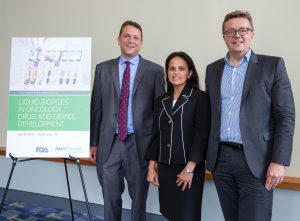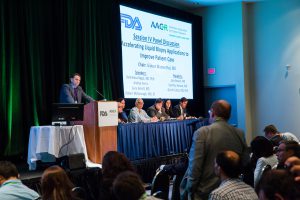Liquid Biopsies in Transforming Cancer Patient Care: AACR Partners with FDA in Moving the Needle
Liquid biopsies, noninvasive tests performed on biofluids to detect genetic alterations in tumors, are a recent revolution in the oncology field. When successfully integrated into clinics, liquid biopsies have the potential to improve cancer diagnosis, monitoring, drug development, and, ultimately, patient outcomes.
This technology is rapidly advancing – last month, the U.S. Food and Drug Administration (FDA) approved the first liquid biopsy test, a companion diagnostic called cobas EGFR Mutation Test v2, to identify patients with metastatic non-small cell lung cancer (NSCLC) eligible for treatment with the EGFR-targeted therapeutic erlotinib (Tarceva).
While liquid biopsies offer manifold possibilities for improving cancer care, like with any emerging technology, there are many practical and logistical challenges in taking this technology to the next level and making it a standard of care for cancer patients. In an effort to address the challenges and identify next steps to move the field forward, the FDA and the American Association for Cancer Research (AACR) jointly held a public workshop on “Liquid Biopsies in Oncology Drug and Device Development” in Washington, D.C., on July 19. The workshop provided a forum for the discussion of relevant scientific advances in the field and of the regulatory environment that will support the translation of this technology into improved patient care.
The workshop was co-chaired by Gideon Blumenthal, MD, from the Office of Hematology and Oncology Products (OHOP) and Center for Drug Evaluation and Research (CDER) at the FDA; Pasi Jänne, MD, PhD, from Dana-Farber Cancer Institute and Harvard Medical School, and a member of the AACR Regulatory Science and Policy Subcommittee; and Reena Philip, PhD, from the Division of Molecular Genetics and Pathology (DMGP), Office of In Vitro Diagnostics and Radiological Health (OIR), and Center for Devices and Radiological Health (CDRH) at the FDA.

Gideon Blumenthal, MD, Reena Philip, PhD, and Pasi Jänne, MD, PhD, were co-chairs of the liquid biopsy workshop. Photo: Alan Lessig
Experts from various sectors of cancer care, including cancer centers and research institutes, pharmaceutical industries, federal agencies, patient advocacy groups, and payers discussed the state of the science, the possibilities and challenges of developing liquid biopsy-based tests, and mechanisms to accelerate the applications of such tests in improving patient care.
Key areas addressed include the potential of extending liquid biopsies beyond identifying the right drug for the right patient, such as in making a diagnosis, risk stratification, and in early detection and management of disease recurrence. The emphasis was on the value in combining these liquid biopsy-based tests, such as circulating tumor cells (CTCs), microRNAs (miRNA), and circulating tumor DNA (ctDNA) with standard diagnostic tests to improve patient outcomes and therefore, the urgency in optimizing, validating, and harmonizing these tests.
Learning from the experience of getting the first liquid biopsy test FDA-approved
A major focus of the workshop was to build on the application of cell-free DNA (cfDNA) technologies for lung cancer. Given that about half of lung cancer patients with metastatic disease across the globe do not get treated because of setbacks with accessibility of the tissue for a biopsy in many cases and lack of specific molecular tests to identify appropriate therapies, there is an unmet need to develop such tests for this indication.
And what better way to make progress than to learn from a recent success story?
Scientists from Roche Molecular Systems Inc. and the FDA who were involved in the development and approval of the cobas EGFR Mutation Test v2 for use in analyzing cfDNA from lung cancer patients, took the audience through the major steps in the process, including the development, testing, validation, and generation of data that preceded the FDA approval, other premarketing studies, regulatory considerations, and clinical reproducibility studies and nonclinical performance studies following FDA approval.
The bottom line is, how do we accelerate liquid biopsy technology to improve patient care? How do we value these tests and how do we reimburse them? To address these questions, several critical aspects were considered, including the importance of multisector collaborations, as well as the perspectives of patients, patient advocates, and payers.
At the end of the day, what matters to a cancer patient is whether the test is “reliable, accurate, and leads to safe and effective therapy,” Blumenthal noted. Efforts by the AACR and the FDA to bring together thought leaders and stakeholders in the field offer immense hope that such technologies will soon be translated into improved cancer patient outcomes.
For details on the topics discussed at the workshop and a list of speakers, please click here.




